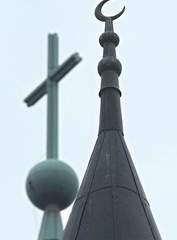- Eat Bulaga! is the longest running variety show that time in the Philippines by Television And Production Exponents Inc. (TAPE) and aired by GMA Network. The show broadcasts from The New TAPE Studios (Eastside Studio) and the GMA Broadway Centrum in New Manila, Quezon City, with its main host Senator Tito Sotto, Vic Sotto and Joey de Leon. The show is also broadcast worldwide through GMA Pinoy TV. The show celebrated its 32nd year on Australian television last 2011. It will also have its first overseas version, to be shown on Indonesia's SCTV network starting July 16, 2012.
- St. Anne Church in Molo, Iloilo which lies in front of the town square has 16 life-sized images of female saints thus earning its moniker "Women / Feminist Church". Its male counterpart is the Jaro Cathedral with 12 male statues (11 apostles and St. Paul).
- Iwahig Prison and Penal Farm in Puerto Princesa City, Palawan, Philippines is one of seven operating units of the Bureau of Corrections under the Department of Justice. This penal settlement, which originally comprised an area of 22 acres, served as a depository for prisoners who could not be accommodated at the NBP Prison in Manila. The prisoners in Iwahig were divided into two groups, settlers and colonists. The settlers are prisoners whose applications for land to cultivate have been approved. Tools, beasts of burden and dwellings were furnished by the government.
- Leinil Francis Yu is a Filipino comic book artist, was first recognized after winning the Wizard's Drawing Contest Board, his first published work. He was first hired by Whilce Portacio to do some work for Wildstorm, but that job fell through. Portacio then passed on samples of Yu's work to Marvel Comics, who subsequently hired him to work on Wolverine. On April 9, 2011 Yu was one of 62 comics creators who appeared at the IGN stage at the Kapow! convention in London to set two Guinness World Records, The Fastest Production of a Comic Book, and Most Contributors to a Comic Book.
- Davao City is the country's largest city outside Metro Manila.A highly urbanized Philippine city. The city serves as the regional center of the region and the center of Metro Davao. It has a population of 1,449,296 according to 2010 census. Local historians of Davao Davao claim that the word came from the phonetic blending of the word of three Bagobo subgroups when referring to Davao River, an essential waterway which empties itself into Davao Gulf near the city. The aboriginal Obos who inhabit the hinterlands of the region called the river, Davoh; the Clatta or Guiangans called it Duhwow or Davau, and the Tagabawa Bagobos, Dabu. To the Obos, davoh the word also means a place "beyond the high grounds", alluding to the settlements located at the mouth of Davao River which were surrounded by high rolling hills. When asked where they were going, the usual reply is davoh, while pointing towards the direction of the town. Duhwow also refers to a trading settlement where they barter their forest goods in exchange for salt or other commodities.
- Adobo is the name of a popular dish and cooking process in Philippine cuisine that involves meat or seafood marinated in a sauce of vinegar and garlic, browned in oil and simmered in the marinade. Although it has a name taken from the Spanish, the cooking method is indigenous to the Philippines. Pickled has been called the quintessential Philippine stew, served with both rice and daily meals and at feasts. It is commonly packed for Filipino mountaineers and travelers because it keeps well without refrigeration.
- The antibiotic erythromycin - used to treat a wide variety of bacterial infections, such as respiratory tract infections, middle ear infections, and skin infections - was created by Filipino scientist Abelardo Aguilar , and has earned American drug giant Eli Lilly billions of dollars. The product was launched commercially in 1952 under the brand name Ilosone (after the Australian region of Queensland where it was originally collected). Erythromycin was formerly also called Ilotycin.
- The first State of the Nation Address (SONA) was delivered by President Manuel L. Quezon on 16 June 1936 at the Legislative Building in Manila.






































